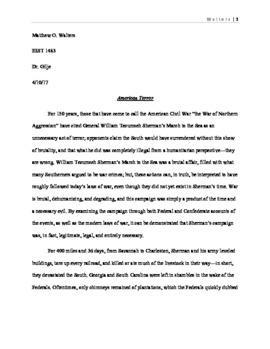| dc.description.abstract | For 150 years, those that have come to call the American Civil War "the War of Northern Aggression" have cited General William Tecumseh Sherman's March to the Sea as an unnecessary act of terror; opponents claim the South would have surrendered without this show of brutality, and that what he did was completely illegal from a humanitarian perspective — they are wrong. William Tecumseh Sherman's March to the Sea was a brutal affair, filled with what many Southerners argued to be war crimes; but, these actions can, in truth, be interpreted to have roughly followed today's laws of war, even though they did not yet exist in Sherman's time. War is brutal, dehumanizing, and degrading, and this campaign was simply a product of the time and a necessary evil. By examining the campaign through both Federal and Confederate accounts of the events, as well as the modern laws of war, it can be demonstrated that Sherman's campaign was, in fact, legitimate, legal, and entirely necessary. | |
